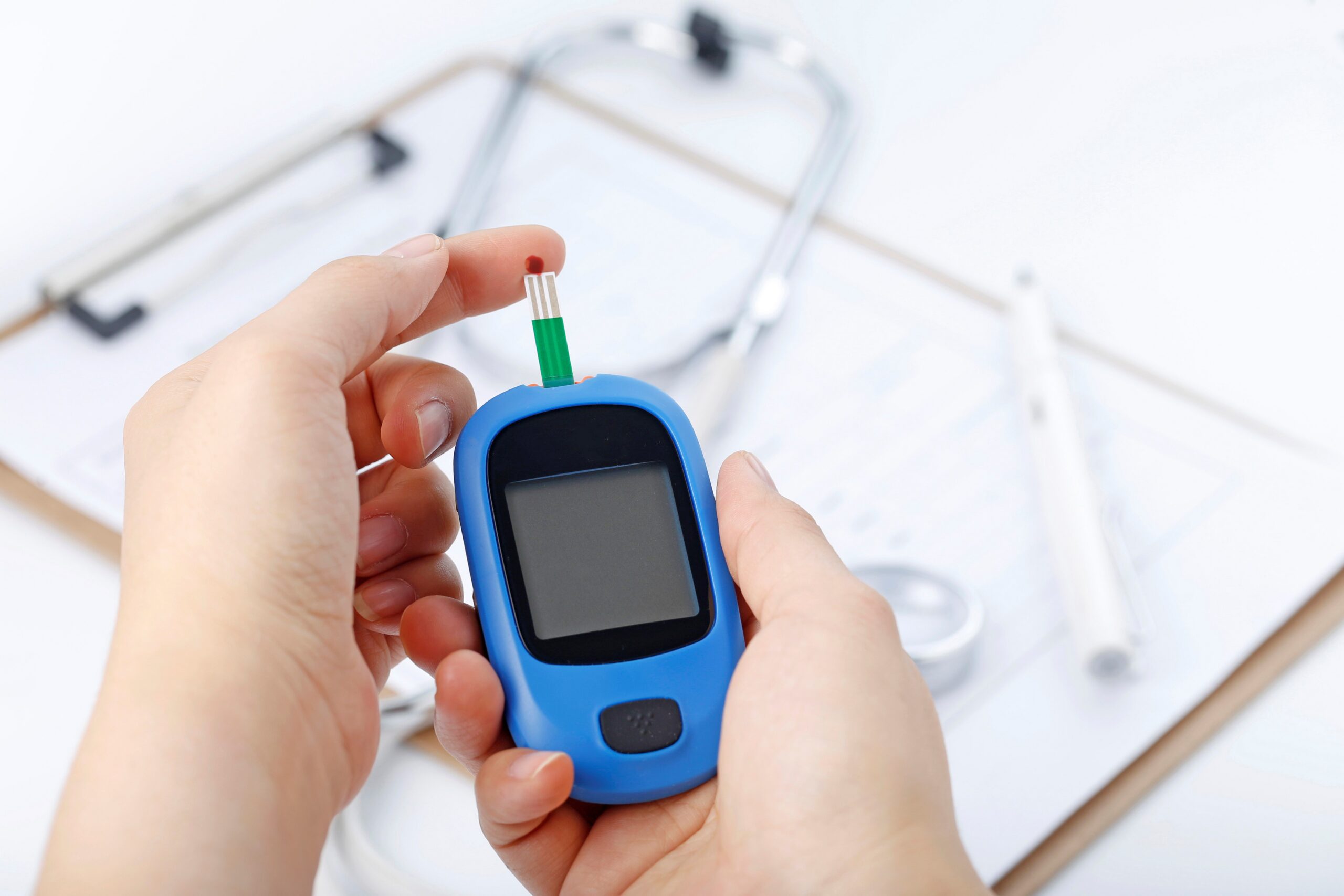Diabetes
Best Diabetologist in Nashik
Diabetes is a chronic metabolic condition characterized by elevated blood glucose (sugar). This occurs either because the pancreas fails to produce enough insulin or because the body is unable to use insulin properly. Insulin is a hormone that regulates blood sugar levels by facilitating the transport of glucose from the bloodstream into cells, where it is used for energy. Visit NIMS Hospital to receive top-notch care for diabetes from the most qualified and Best Diabetologist in Nashik.

There are three main types of diabetes:
- Type 1 diabetes: This type of diabetes, also known as insulin-dependent diabetes, is an autoimmune disorder in which the immune system attacks and destroys the insulin-producing cells in the pancreas. This results in a complete deficiency of insulin, causing glucose to accumulate in the bloodstream. Type 1 diabetes typically develops during infancy or adolescence, but it can occur at any age. Blood sugar levels must be controlled with insulin for the rest of one’s life.
- Type 2 diabetes: This is the most common type of diabetes, accounting for 90-95% of all cases. It occurs when the body becomes resistant to insulin or when the pancreas fails to produce enough insulin to meet the body’s needs. Type 2 diabetes is often associated with lifestyle factors such as poor diet, physical inactivity, and obesity. It can usually be managed through lifestyle modifications such as regular exercise, a healthy diet, and weight loss, but some patients may require oral medication or insulin injections.
- Gestational diabetes: This kind of diabetes develops during pregnancy and normally resolves after the baby is born. It occurs when the hormones produced during pregnancy interfere with the body’s ability to use insulin effectively, resulting in high blood sugar levels. Gestational diabetes can raise the risk of pregnancy and delivery problems, as well as the risk of developing type 2 diabetes later in life.
Other types of diabetes include monogenic diabetes, which is caused by mutations in a single gene, and cystic fibrosis-related diabetes, which is a complication of cystic fibrosis that affects the pancreas.
Diabetes, if left untreated or inadequately managed, can lead to a variety of problems. These include:
- Cardiovascular disease: High blood sugar levels can damage blood vessels and increase the risk of heart attack, stroke, and other cardiovascular problems.
- Nerve damage: High blood sugar levels can damage nerves, leading to tingling, numbness, or pain in the feet and hands, and eventually leading to complications such as diabetic neuropathy.
- Kidney damage: High blood sugar levels can damage the kidneys, leading to a condition known as diabetic nephropathy. This can eventually progress to kidney failure, requiring dialysis or kidney transplantation.
- Eye damage: High blood sugar levels can damage the blood vessels in the eyes, leading to diabetic retinopathy, which can cause blindness if left untreated.
- Foot damage: High blood sugar levels can damage the blood vessels and nerves in the feet, leading to poor circulation, foot ulcers, and even amputation.
Diabetes treatment is determined on the kind and severity of the ailment. In general, treatment involves maintaining healthy blood sugar levels to prevent or delay the onset of complications.
At NIMS Hospital, our team of highly skilled and Best Diabetologist in Nashik is dedicated to providing the best possible care for patients with diabetes. With state-of-the-art facilities and personalized treatment plans, we strive to ensure that each patient receives comprehensive and effective management of their condition. Our commitment to excellence and patient-centric approach make us the preferred choice for diabetes care in Nashik.
- Type 1 diabetes: This type of diabetes requires lifelong insulin therapy to regulate blood sugar levels. Insulin can be delivered via injection or an insulin pump, and dosages must be adjusted based on factors such as diet, exercise, and stress.
- Type 2 diabetes: The treatment of type 2 diabetes typically involves lifestyle modifications such as regular exercise, a healthy diet, and weight loss. In some cases, oral medication or insulin injections may also be necessary to regulate blood sugar levels.
- Gestational diabetes: This type of diabetes can often be managed through dietary changes and exercise, but some women may require insulin therapy to regulate blood sugar levels. It is important to closely monitor blood sugar levels during pregnancy to prevent complications for both the mother and the baby.
In addition to medication and lifestyle changes, there are other strategies that can help manage diabetes and prevent complications. These include:
- Regular blood sugar monitoring: Regular monitoring of blood sugar levels is essential for managing diabetes. Home blood sugar testing or continuous glucose monitoring equipment can be used to do this.
- Healthy diet: A healthy diet that is rich in fiber, whole grains, fruits, vegetables, and lean proteins can help regulate blood sugar levels and prevent complications.
- Regular Exercise: Exercise on a regular basis can assist increase insulin sensitivity and blood sugar levels. Before beginning an exercise programme, it is critical to talk with a healthcare provider.
- Stress management: Excessive stress might raise blood sugar levels. Strategies such as meditation, yoga, or counseling can help manage stress and improve overall health.
- Quitting smoking: Smoking increases the risk of complications associated with diabetes, such as cardiovascular disease and nerve damage. Quitting smoking can improve general health and lower the risk of these consequences.
In conclusion, diabetes is a chronic metabolic disorder characterized by high levels of glucose in the blood. Diabetes is divided into three types: type 1 diabetes, type 2 diabetes, and gestational diabetes. Diabetes can cause a range of complications if left untreated or poorly managed, including cardiovascular disease, nerve damage, kidney damage, eye damage, and foot damage. Treatment of diabetes depends on the type and severity of the condition and may involve medication, lifestyle changes, and other strategies to manage blood sugar levels and prevent complications. It is important for individuals with diabetes to work closely with their healthcare provider to develop an individualized treatment plan and to monitor blood sugar levels regularly to prevent complications. Experience the best diabetes care with our Best Diabetologist in Nashik at NIMS Hospital, who are committed to providing exceptional treatment and personalized care for patients with diabetes.
FAQs
Types of diabetes are type 1 diabetes, type 2 diabetes, and gestational diabetes.
Symptoms of diabetes can include increased thirst, frequent urination, blurred vision, fatigue, weight loss, and slow-healing wounds
A blood test that detects the amount of glucose in the blood can be used to diagnose diabetes.
NIMS Hospital offers a range of treatments for diabetes, including medication, insulin therapy, dietary and lifestyle changes, and regular monitoring. If you are looking for diabetes treatment then consult our Best Diabetologist in Nashik.
While some diabetes risk factors, such as genetics, cannot be changed, lifestyle changes such as maintaining a healthy weight, eating a balanced diet, and exercising regularly can help minimize the chance of developing Type 2 diabetes.

